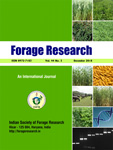K. SHAMINI*, T. EZHILARASI, K. N. GANESAN, S. D. SIVAKUMAR AND S. GEETHA
Department of Forage Crops, Centre for Plant Breeding and Genetics
Tamil Nadu Agricultural University, Coimbatore-641 003 (Tamil Nadu), India
*(e-mail : kshamini93@gmail.com)
(Received : 10 November 2021; Accepted : 24 December 2021)
SUMMARY
Guinea grass is one of the promising grass fodder crop originated from Africa and introduced into India. It plays a major role in livestock productivity due to its higher biomass and shorter duration. Though enough variability is present in Guinea grass, studies were limited in ascertaining its genetic variability. The present study was carried out in 75 accessions explored from different parts of India to estimate the magnitude of genetic variability, correlation and path analysis in Guinea grass for green fodder yield and its associated traits. The data recorded in the replicated experiment on different yield contributing traits revealed moderate PCV and GCV for the traits viz., number of tillers and leaf weight. High heritability coupled with moderate genetic advance was recorded in plant height and number of tillers while moderate heritability and genetic advance were observed in leaf weight. It implies that these traits are controlled by non additive gene action and direct selection may not be effective. Hence, further improvement in green fodder yield is feasible only through creation of variability followed by selection. Association studies revealed that plant height, leaf length, leaf breath and leaf weight were significantly and positively associated with green fodder yield. The trait leaf weight exhibited high direct effect on green fodder yield. Therefore, selection for these associated traits would be effective for enhancing the green fodder yield in Guinea grass.
Key words: Guinea grass, variability, association study, green fodder yield

